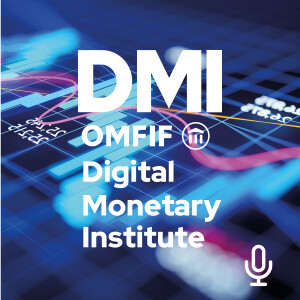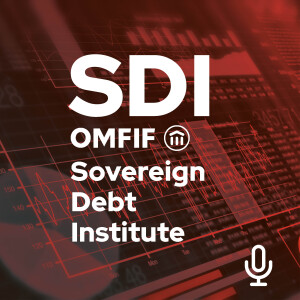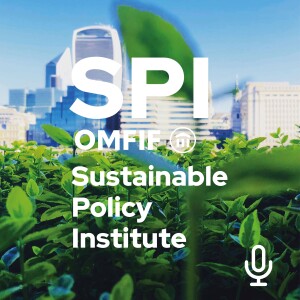
247.7K
Downloads
594
Episodes
Subscribe to the OMFIF podcast for the latest news and insight on financial markets, monetary policy and global investment themes. Published weekly, the podcast features input from a range of academic experts, central bankers and investment professionals. Visit our website at www.omfif.org.
Subscribe to the OMFIF podcast for the latest news and insight on financial markets, monetary policy and global investment themes. Published weekly, the podcast features input from a range of academic experts, central bankers and investment professionals. Visit our website at www.omfif.org.
Episodes

Wednesday Dec 21, 2022
OMFIF Public investor outlook 2023
Wednesday Dec 21, 2022
Wednesday Dec 21, 2022
As they head into the new year, what are the primary concerns for public asset owners? Where should they expect continuities from 2022, and where will there be divergence? How will they adjust to the new reality of higher risk, more uncertainty and more a volatile macro environment?
Max Castelli, head of strategy and advice, global sovereign markets, UBS Asset Management, joins Taylor Pearce, economist, OMFIF, to discuss these key questions and delve into diversification, inflation, quantitative tightening, environmental, social and governance concerns and other priorities for reserve managers in 2023.

Wednesday Dec 21, 2022
Everything FTX
Wednesday Dec 21, 2022
Wednesday Dec 21, 2022
Sinan Yilmaz, account and content manager at OMFIF, sits down with Lewis McLellan, editor of the Digital Monetary Institute, to discuss everything related to FTX and its downfall. Including, but not limited to the domino effects, if MiCa would have prevented this, and how Enron compares to Enron in the early 2000's.
If you have any requests, ideas or questions for our speakers, do drop us an email at enquiries@omfif.org.

Monday Dec 19, 2022
Jana Harvey on the debt outlook for EM sovereigns in 2023
Monday Dec 19, 2022
Monday Dec 19, 2022
Jana Velebova-Harvey, senior portfolio manager in the emerging markets team at BlueBay Asset Management, speaks to Burhan Khadbai, head of content at OMFIF’s Sovereign Debt Institute, on the issuance conditions for emerging market sovereigns in 2022 and the outlook for the year ahead.
Velebova-Harvey talks about the challenges EM sovereigns have faced in accessing the primary market, innovative environmental, social and governance-themed debt restructuring such as debt for nature swaps and carbon-backed bonds, and Ukraine’s reconstruction and recovery.

Tuesday Nov 29, 2022
Responsible lending with BNPL
Tuesday Nov 29, 2022
Tuesday Nov 29, 2022
Wenbin Wong, head of GrabFin Singapore, and Lewis McLellan, editor of the Digital Monetary Institute, discuss ‘buy now, pay later’ — a rapidly growing form of consumer lending. The ease of use and accessibility that BNPL offers could make it a valuable tool for economic empowerment, but as consumer exposure grows, it is vital that regulators keep a close eye on unintended outcomes in the marketplace. This podcast explores the benefits that BNPL can bring for individuals, particularly in south east Asia, who are underserved by traditional banking services, as well as the recent Singapore BNPL code of conduct, which could provide a framework for other jurisdictions looking to keep their burgeoning BNPL markets safe.

Thursday Nov 24, 2022
Is this the end of globalisation?
Thursday Nov 24, 2022
Thursday Nov 24, 2022
Geopolitical tensions were apparent even before Russia’s invasion of Ukraine, clearly evident in the US-China trade war and exacerbated by prolonged supply chain disruptions due to the pandemic and surrounding policy measures. Some economists have argued that we’re entering – or that we have already entered – an era of multipolarity and global economic fragmentation. Discussing the various pillars of globalisation, Massimiliano Castelli, head of strategy and advice, and Philipp Salman, strategy and advice, global sovereign markets, UBS Asset Management, speak with Taylor Pearce, economist, OMFIF on why the deglobalisation story is more complicated than it seems, with a particular focus on emerging trends in global trade and finance.
The views expressed are as of November 2022 and are those of the author and not necessarily the views of UBS Asset Management. This podcast is a marketing communication and the information herein should not be considered investment advice or a recommendation to purchase or sell securities or any particular strategy or fund. Information and opinions have been provided in good faith and are subject to change without notice.

Wednesday Nov 23, 2022
Christian Kopf on liquidity and volatility in the European SSA bond market
Wednesday Nov 23, 2022
Wednesday Nov 23, 2022
Christian Kopf, head of fixed income at Union Investment, speaks to Burhan Khadbai, head of content at OMFIF’s Sovereign Debt Institute, about the difficult market conditions European public sector borrowers face.
Kopf outlines the macro environment for fixed income and the rate hiking cycle, deteriorating liquidity and high volatility for European government bonds, and why he sees an opportunity for certain supranational and agency borrowers. Kopf also gives his thoughts on the sterling bond market and why it will take time before confidence is restored following the chaos of the controversial mini budget. This podcast was recorded on 1 November.

Thursday Nov 10, 2022
Avoiding a debt crisis
Thursday Nov 10, 2022
Thursday Nov 10, 2022
The Bank of England’s intervention in September to restart gilt purchases to support markets and pension funds troubled by rising rates and unfunded fiscal expansion is a warning that fiscal considerations are becoming a more potent force in monetary decisions. It could also be an early test case for other quantitative easing countries grappling with bloated central bank balance sheets, high debt and rising policy rates.
Neil Williams, chief economist and Taylor Pearce, economist at OMFIF, discuss what the forces driving government funding costs will be, whether there are other measures available and how they might suit the UK.
Global Public Pensions 2022, OMFIF’s survey of pension funds, is launching on Tuesday 6 December.

Wednesday Nov 02, 2022
Countdown to COP27: More African countries implementing sustainability-focused policies
Wednesday Nov 02, 2022
Wednesday Nov 02, 2022
With only days to go until COP27 takes place in Sharm el-Sheikh, Egypt, there is hope that it will focus on priority issues for the African continent, including addressing Africa’s climate challenges and the deadlock on climate finance. The Absa Africa Financial Markets Index 2022, published by OMFIF, found that more African countries are implementing environmental, social and governance policies and offering sustainable financial products.
Ahead of this year’s climate conference, Katerina Atkins, programme coordinator of OMFIF’s Sustainable Policy Institute, speaks with Nikhil Sanghani, OMFIF’s managing director of research, about the findings of the report on the availability of sustainable products and ESG policy indicators across the African continent. They discuss which African countries are spearheading sustainable financial product offerings and why it is important for the continent to continue working on sustainability-focused policies.

Tuesday Nov 01, 2022
Tammo Diemer on weak demand for Bunds, the repo market and EU joint debt
Tuesday Nov 01, 2022
Tuesday Nov 01, 2022
Burhan Khadbai, head of content at OMFIF’s Sovereign Debt Institute, sits down with Tammo Diemer, member of the management board at Deutsche Finanzagentur, to discuss the unprecedented volatility and challenges facing the German government bond market.
Diemer discusses the weak demand facing Bunds – including the recent seven-year auction and 30-year syndication – the Finanzagentur’s decision to tap bonds to use in the repo market, joint EU debt to fund the energy crisis, the performance of Germany’s green bonds and the outlook for 2023.

Thursday Oct 27, 2022
Can central banks normalise their balance sheets?
Thursday Oct 27, 2022
Thursday Oct 27, 2022
While announced as a temporary measure, the Bank of England’s purchases of long-dated gilts is another reminder of how central banks will struggle to reduce bloated balance sheets. Japan’s quantitative easing rumbles on, and the US and euro area are still at the nascent stage of addressing their central bank’s finances. QE globally has been no panacea, and the BoE has been quick to differentiate financial support from QE. Yet, by trying to suppress bond yields and signalling that money printing can be used to finance fiscal spending, it suggests fiscal considerations have in QE countries become a more potent force behind monetary decisions as rates rise. In the UK, ‘the kindness of strangers’ will increasingly hinge more on yield, currency and ratings considerations compared to Japan.
Is the UK a test case for others, what are the problems and where do we go from here? Neil Williams, chief economist, and Taylor Pearce, economist, OMFIF, discuss.
